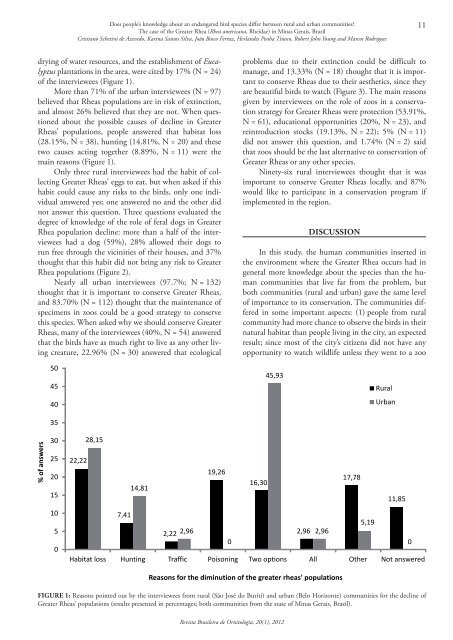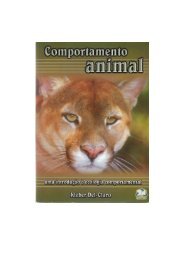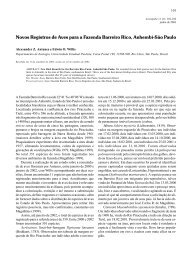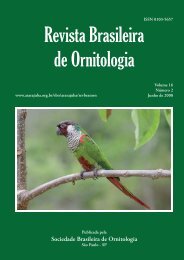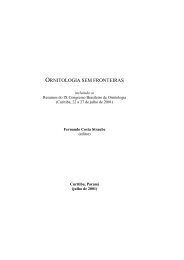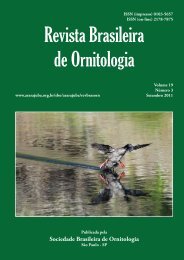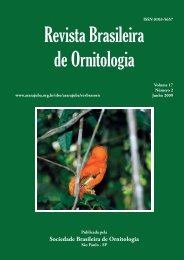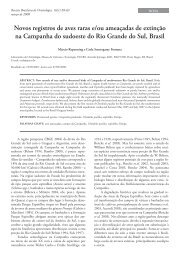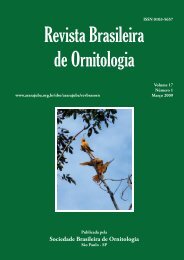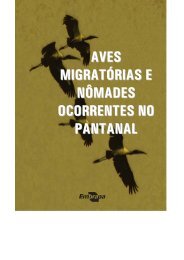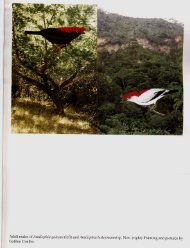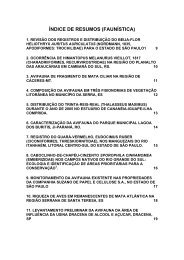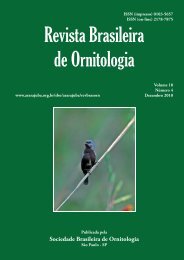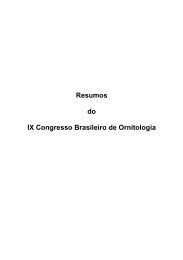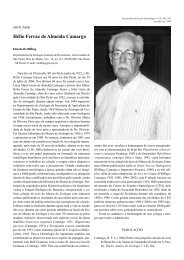10Does people’s knowledge about an endangered bird species differ between rural and urban communities?The case of the Greater Rhea (Rhea americana, Rheidae) in Minas Gerais, BrazilCristiano Schetini <strong>de</strong> Azevedo, Karina Santos Silva, João Bosco Ferraz, Herlan<strong>de</strong>s Penha Tinoco, Robert John Young and Marcos Rodriguesby the interviewees, which explain different samples sizesobtained in the result section (e.g., only 124 people in therural community answered their gen<strong>de</strong>r, while 11 peopledid not answer this question).The questionnaires inten<strong>de</strong>d to evaluate the knowledgeand the perceptions of the populations about theconservation of the Greater Rheas. We collected general<strong>de</strong>mographic information about the interviewed publicsuch as gen<strong>de</strong>r, age, schooling (level), profession andbirthplace, and specific information, such as the role ofintroduced predators (e.g., feral dogs) and zoos in theconservation of Greater Rheas. The schooling categoriesfollowed the Brazilian educational system: fundamentallevel (seven to 14 years old), secondary level (15 to 18years old), technical school (15 to 18 years old school),and college level (19 to 23 years old). Data were summarizedand analyzed statistically using the Chi-squaretest. All tests were run using MINITAB v.12 (1998) witha confi<strong>de</strong>nce level of 95% (α = 0.05, Zar 1999).ResultsThe chi-squared test showed that the intervieweesopinions differed significantly between rural and urbanpopulations for the sightings of Greater Rheas in thewild, with rural communities seeing more birds thanurban ones (X 2 = 143.41, DF = 1, p < 0.01). In termsTable 1: Age and schooling of the rural and urban intervieweesquestioned in this study on Greater Rheas (N = absolute number;% = relative number).Rural Community (São José do Buriti)Schooling N % Age N %Incomplete fundamental 45 33.34 10‐19 61 45.19Complete fundamental 9 6.67 <strong>20</strong>‐29 23 17.04Incomplete secondary 43 31.85 30‐39 8 5.93Complete secondary 13 9.63 40‐49 14 10.37Incomplete university 0 0.00 50‐59 9 6.67Complete university 2 1.48 60‐69 6 4.44Technical 4 2.96 70‐79 5 3.70Not answered 19 14.07 Not 9 6.67answeredTotal 135 100 Total 135 100Urban community (Zoo visitors)Schooling N % Age N %Incomplete fundamental 1 0.74 10‐19 10 7.41Complete fundamental 24 17.78 <strong>20</strong>‐29 48 35.56Incomplete secondary <strong>20</strong> 14.81 30‐39 37 27.41Complete secondary 60 44.44 40‐49 22 16.30Incomplete university 7 5.19 50‐59 15 11.11Complete university 15 11.11 60‐69 1 0.74Technical 0 0.00 70‐79 2 1.48Not answered 6 4.44 Not 0 0.00answeredTotal 135 100 Total 135 100of recognition of the Greater Rheas, rural communitiesi<strong>de</strong>ntified these birds more correctly than urban communities(X 2 = 18.24, DF = 1, p < 0.01). In terms of opinionabout Greater Rheas’ risk of extinction, the rural communitybelieved that Greater Rheas are in Greater risk ofextinction than urban communities (X 2 = 8.60, DF = 1,p < 0.05), and as for the causes of Greater Rheas’ population<strong>de</strong>crease, urban people suggested more causes thanthe rural community (X 2 = 37.09, DF = 1, p < 0.01).In the rural community, we interviewed 84 men and40 women. The majority of people aged between 10 and19 years old (45.19%, N = 61), the next highest categorywas of <strong>20</strong>‐29 years old (17.04%, N = 23, Table 1). Mostof the interviewees had incomplete primary school (sevento 14 years old, 33.34%, N = 45) or incomplete secondaryschool (15 to 18 years old, 31.85%, N = 43, Table 1).Stu<strong>de</strong>nts (N = 26), farm-hands (N = 14) and forestry assistants(N = 11) were the most encountered professions.In the urban community, we interviewed 62 menand 73 women. The majority of people had an age varyingbetween <strong>20</strong> and 29 years old (35.56%), the next mostprominent category being of 30‐39 years old (27.41%,Table 1). Schooling varied from a complete fundamentallevel (seven to 14 years old, 17.78%, N = 23) to completesecondary school (15 to 18 years old, 44.44%, N = 60,Table 1). Stu<strong>de</strong>nts (N = 13), drivers (N = 9) and teachers(N = 6) were the most encountered occupations.Most of the rural interviewees recognized the GreaterRhea photograph (N = 1<strong>20</strong>, 88.89%). One-hundredand two people said that they had seen the birds in thestudy region, while 10 people had never seen them. Mostof the interviewees (N = 96, 71.11%) reported seeingGreater Rheas only in open habitats, such as grasslandsand open Cerrado; 2.22% (N = 3) reported seeing thebirds in forests and 8.89% (N = 12) saw them insi<strong>de</strong> Eucalyptusforests; the same percentage of people saw Rheasin both open and forest areas. One interviewee (0.74%)told that he saw one individual locked insi<strong>de</strong> a pen, andone interviewee (0.74%) saw the birds in all habitats.Many of the urban interviewees recognized theGreater Rhea (67.41%, N = 91), but 44 (32.59%) individualsconfused Rheas with ostriches or did not recognizethe bird. One-hundred and fourteen (84.44%)persons said that they had not seen Greater Rheas in thewild; 19 (14.07%) people had seen wild Greater Rheas atleast once in their lifetimes.More than 85% of the rural interviewees (N = 115)believed that Greater Rheas’ local populations were vanishing,and 12% (N = 16) did not believed that GreaterRhea populations were reducing. When questioned aboutthe possible causes of <strong>de</strong>cline in the local populations,people answered: habitat loss (22%, N = 30), poisoningfrom pestici<strong>de</strong>s (19%, N = 26), hunting (7%, N = 10),and other reasons not listed in the questionnaire, suchas the increased transit of people and cars in the region,Revista <strong>Brasileira</strong> <strong>de</strong> <strong>Ornitologia</strong>, <strong>20</strong>(1), <strong>20</strong>12
Does people’s knowledge about an endangered bird species differ between rural and urban communities?The case of the Greater Rhea (Rhea americana, Rheidae) in Minas Gerais, BrazilCristiano Schetini <strong>de</strong> Azevedo, Karina Santos Silva, João Bosco Ferraz, Herlan<strong>de</strong>s Penha Tinoco, Robert John Young and Marcos Rodrigues11drying of water resources, and the establishment of Eucalyptusplantations in the area, were cited by 17% (N = 24)of the interviewees (Figure 1).More than 71% of the urban interviewees (N = 97)believed that Rheas populations are in risk of extinction,and almost 26% believed that they are not. When questionedabout the possible causes of <strong>de</strong>cline in GreaterRheas’ populations, people answered that habitat loss(28.15%, N = 38), hunting (14.81%, N = <strong>20</strong>) and thesetwo causes acting together (8.89%, N = 11) were themain reasons (Figure 1).Only three rural interviewees had the habit of collectingGreater Rheas’ eggs to eat, but when asked if thishabit could cause any risks to the birds, only one individualanswered yes; one answered no and the other didnot answer this question. Three questions evaluated the<strong>de</strong>gree of knowledge of the role of feral dogs in GreaterRhea population <strong>de</strong>cline: more than a half of the intervieweeshad a dog (59%), 28% allowed their dogs torun free through the vicinities of their houses, and 37%thought that this habit did not bring any risk to GreaterRhea populations (Figure 2).Nearly all urban interviewees (97.7%; N = 132)thought that it is important to conserve Greater Rheas,and 83.70% (N = 112) thought that the maintenance ofspecimens in zoos could be a good strategy to conservethis species. When asked why we should conserve GreaterRheas, many of the interviewees (40%, N = 54) answeredthat the birds have as much right to live as any other livingcreature, 22.96% (N = 30) answered that ecologicalproblems due to their extinction could be difficult tomanage, and 13.33% (N = 18) thought that it is importantto conserve Rheas due to their aesthetics, since theyare beautiful birds to watch (Figure 3). The main reasonsgiven by interviewees on the role of zoos in a conservationstrategy for Greater Rheas were protection (53.91%,N = 61), educational opportunities (<strong>20</strong>%, N = 23), andreintroduction stocks (19.13%, N = 22); 5% (N = 11)did not answer this question, and 1.74% (N = 2) saidthat zoos should be the last alternative to conservation ofGreater Rheas or any other species.Ninety-six rural interviewees thought that it wasimportant to conserve Greater Rheas locally, and 87%would like to participate in a conservation program ifimplemented in the region.DiscussionIn this study, the human communities inserted inthe environment where the Greater Rhea occurs had ingeneral more knowledge about the species than the humancommunities that live far from the problem, butboth communities (rural and urban) gave the same levelof importance to its conservation. The communities differedin some important aspects: (1) people from ruralcommunity had more chance to observe the birds in theirnatural habitat than people living in the city, an expectedresult; since most of the city’s citizens did not have anyopportunity to watch wildlife unless they went to a zooFigure 1: Reasons pointed out by the interviewees from rural (São José do Buriti) and urban (Belo Horizonte) communities for the <strong>de</strong>cline ofGreater Rheas’ populations (results presented in percentages; both communities from the state of Minas Gerais, Brazil).Revista <strong>Brasileira</strong> <strong>de</strong> <strong>Ornitologia</strong>, <strong>20</strong>(1), <strong>20</strong>12


